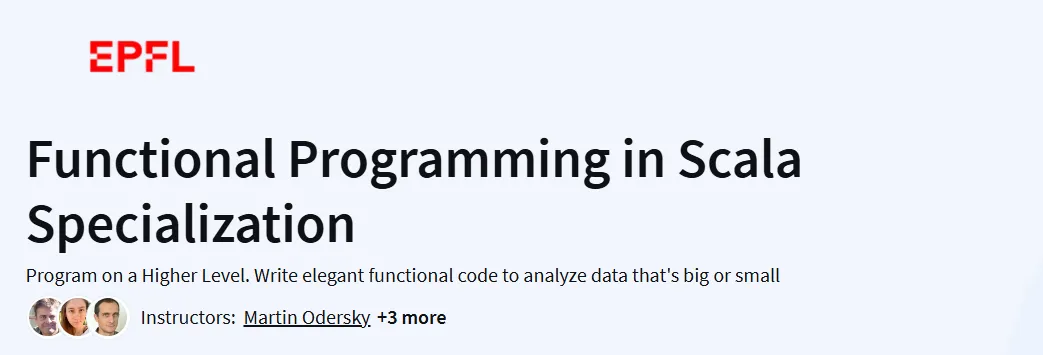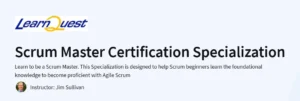What will you learn in this Functional Programming in Scala Specialization Course
Write purely functional programs using recursion, pattern matching, and higher-order functions.
Design immutable data structures and understand their applications.
Implement parallel algorithms and leverage parallel collections for performance gains.
Manipulate and analyze big data using Apache Spark and Scala.
Apply functional programming principles to real-world data-intensive applications.
Program Overview
1. Functional Programming Principles in Scala
⏳ 56 hours
Learn the fundamentals of functional programming, including recursion, pattern matching, and higher-order functions, using Scala.
2. Functional Program Design in Scala
⏳ 35 hours
Explore advanced functional programming concepts such as lazy evaluation, monads, and type-directed programming to design robust Scala applications.
3. Parallel Programming
⏳ 32 hours
Understand the principles of parallel computing and implement parallel algorithms using Scala’s parallel collections and tools.
4. Big Data Analysis with Scala and Spark
⏳ 27 hours
Learn to process and analyze large datasets using Apache Spark, applying functional programming techniques for distributed computing.
5. Capstone Project: Functional Programming in Scala
⏳ 20 hours
Apply the skills acquired throughout the specialization to build a data-intensive application using real-world datasets.
Get certificate
Job Outlook
Equips learners for roles such as Scala Developer, Data Engineer, and Big Data Analyst.
Applicable in industries like finance, technology, and data science.
Enhances employability by teaching practical skills in functional programming and big data processing.
Supports career advancement in software development and data engineering roles.
Specification: Functional Programming in Scala Specialization
|
FAQs
- Scala is widely used in big data (especially with Apache Spark).
- It combines functional and object-oriented paradigms.
- Many finance and tech companies rely on Scala for scalability.
- Functional skills transfer easily to languages like Haskell or F#.
- Demand may be niche but offers strong career prospects.
- Basic algebra and logical thinking are sufficient.
- Course focuses on programming concepts, not heavy math.
- Some exposure to recursion and data structures helps.
- Higher-order functions require logical reasoning, not equations.
- Advanced math (like category theory) is not required.
- Expect an adjustment in mindset rather than syntax.
- Pure functions and immutability differ from traditional coding.
- Concepts like monads and lazy evaluation can be tricky initially.
- Small projects and repetition ease the transition.
- Once mastered, functional programming often feels more natural.
- Yes, the course includes Scala with Apache Spark.
- Learners practice distributed data processing tasks.
- Knowledge aligns with industry big data workflows.
- Helps in roles like data engineer or big data analyst.
- Complements Hadoop, Kafka, and cloud-based big data tools.
- Improves logical reasoning and abstraction ability.
- Strengthens understanding of recursion, immutability, and concurrency.
- Makes learning other functional languages easier.
- Enhances problem-solving approach even in imperative languages.
- Encourages writing cleaner, more maintainable code.





